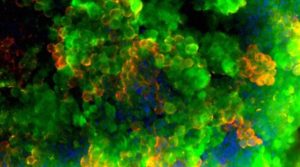Brain boost: An injection of stem cells can improve cognition in rats.
© The Sanger Institute. Wellcome Images
BY JESSICA WRIGHT / 14 NOVEMBER 2016
Stem cells injected into young rats populate their brains with a type of neuron that dampens brain activity. The treatment makes the rats more sociable and flexible when learning tasks than they were previously.
The unpublished results were reported Saturday at the 2016 Society for Neuroscience annual meeting in San Diego.
The findings hint at the promise of stem cell therapy for autism, although any clinical application of this treatment is a long way off, says Jennifer Donegan, postdoctoral fellow in Daniel Lodge’s lab at the University of Texas Health Science Center in San Antonio, who presented the findings.
In the study, Donegan and her colleagues used mouse embryonic stem cells that were on their way to becoming so-called parvalbumin neurons. This type of neuron dampens brain activity and may be lacking in some people with autism.
To ensure that they injected only this type of stem cell, they fused a gene for a fluorescent protein to a gene specific to parvalbumin neurons. They then used this fluorescent marker to sort the cells. This purity is important: A mixed population of stem cells could lead to brain tumors, Donegan says.
Some studies suggest that autism mouse models have fewer of these inhibitory neurons than control mice do. Other studies have shown that gamma-aminobutyric acid (GABA), the neurotransmitter these neurons release, may be scarce in the brains of people with autism. These findings bolster the theory that some autism brains are hyperexcitable.
An influx of parvalbumin neurons might restore the balance, Donegan says. FOR MORE: https://spectrumnews.org/news/stem-cell-transplant-makes-rats-social/

